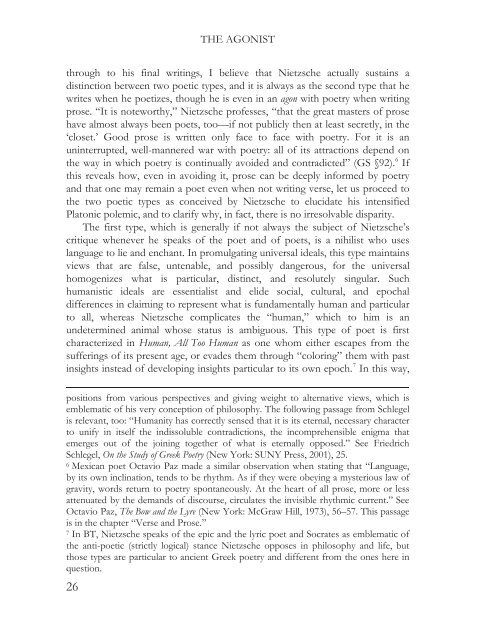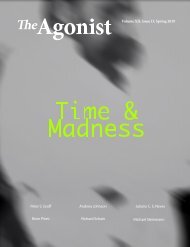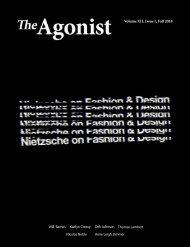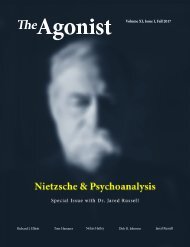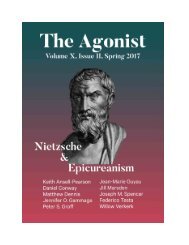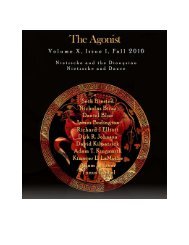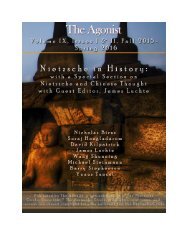Volume XI, Issue II, Spring 2018
You also want an ePaper? Increase the reach of your titles
YUMPU automatically turns print PDFs into web optimized ePapers that Google loves.
THE AGONIST<br />
through to his final writings, I believe that Nietzsche actually sustains a<br />
distinction between two poetic types, and it is always as the second type that he<br />
writes when he poetizes, though he is even in an agon with poetry when writing<br />
prose. “It is noteworthy,” Nietzsche professes, “that the great masters of prose<br />
have almost always been poets, too—if not publicly then at least secretly, in the<br />
‘closet.’ Good prose is written only face to face with poetry. For it is an<br />
uninterrupted, well-mannered war with poetry: all of its attractions depend on<br />
the way in which poetry is continually avoided and contradicted” (GS §92). 6 If<br />
this reveals how, even in avoiding it, prose can be deeply informed by poetry<br />
and that one may remain a poet even when not writing verse, let us proceed to<br />
the two poetic types as conceived by Nietzsche to elucidate his intensified<br />
Platonic polemic, and to clarify why, in fact, there is no irresolvable disparity.<br />
The first type, which is generally if not always the subject of Nietzsche’s<br />
critique whenever he speaks of the poet and of poets, is a nihilist who uses<br />
language to lie and enchant. In promulgating universal ideals, this type maintains<br />
views that are false, untenable, and possibly dangerous, for the universal<br />
homogenizes what is particular, distinct, and resolutely singular. Such<br />
humanistic ideals are essentialist and elide social, cultural, and epochal<br />
differences in claiming to represent what is fundamentally human and particular<br />
to all, whereas Nietzsche complicates the “human,” which to him is an<br />
undetermined animal whose status is ambiguous. This type of poet is first<br />
characterized in Human, All Too Human as one whom either escapes from the<br />
sufferings of its present age, or evades them through “coloring” them with past<br />
insights instead of developing insights particular to its own epoch. 7 In this way,<br />
positions from various perspectives and giving weight to alternative views, which is<br />
emblematic of his very conception of philosophy. The following passage from Schlegel<br />
is relevant, too: “Humanity has correctly sensed that it is its eternal, necessary character<br />
to unify in itself the indissoluble contradictions, the incomprehensible enigma that<br />
emerges out of the joining together of what is eternally opposed.” See Friedrich<br />
Schlegel, On the Study of Greek Poetry (New York: SUNY Press, 2001), 25.<br />
6 Mexican poet Octavio Paz made a similar observation when stating that “Language,<br />
by its own inclination, tends to be rhythm. As if they were obeying a mysterious law of<br />
gravity, words return to poetry spontaneously. At the heart of all prose, more or less<br />
attenuated by the demands of discourse, circulates the invisible rhythmic current.” See<br />
Octavio Paz, The Bow and the Lyre (New York: McGraw Hill, 1973), 56–57. This passage<br />
is in the chapter “Verse and Prose.”<br />
7 In BT, Nietzsche speaks of the epic and the lyric poet and Socrates as emblematic of<br />
the anti-poetic (strictly logical) stance Nietzsche opposes in philosophy and life, but<br />
those types are particular to ancient Greek poetry and different from the ones here in<br />
question.<br />
26


